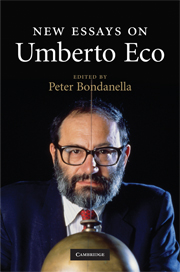Book contents
- Frontmatter
- Contents
- Notes on contributors
- Preface
- Acknowledgments
- 1 Eco and popular culture
- 2 Eco's semiotic theory
- 3 Eco's scientific imagination
- 4 From the Rose to the Flame: Ecos theory and fiction between the middle Ages and postmodernity
- 5 Eco's middle Ages and the historical novel
- 6 Eco and the tradition of the detective story
- 7 “The subject is in the adverbs.” The role of the subject in Eco's semiotics
- 8 Double coding memorabilia in The Mysterious Flame of Queen Loana
- 9 Eco and Joyce
- 10 Eco on film
- Selected bibliography on Eco
- Index
8 - Double coding memorabilia in The Mysterious Flame of Queen Loana
Published online by Cambridge University Press: 26 January 2010
- Frontmatter
- Contents
- Notes on contributors
- Preface
- Acknowledgments
- 1 Eco and popular culture
- 2 Eco's semiotic theory
- 3 Eco's scientific imagination
- 4 From the Rose to the Flame: Ecos theory and fiction between the middle Ages and postmodernity
- 5 Eco's middle Ages and the historical novel
- 6 Eco and the tradition of the detective story
- 7 “The subject is in the adverbs.” The role of the subject in Eco's semiotics
- 8 Double coding memorabilia in The Mysterious Flame of Queen Loana
- 9 Eco and Joyce
- 10 Eco on film
- Selected bibliography on Eco
- Index
Summary
In five important novels, Umberto Eco has pursued his art of instructing and entertaining with thought-provoking, hybrid, encyclopedic fiction. masterful, playful combinations of erudition and popular culture, his fiction consistently demonstrates his love of writing double-coded fiction that allows for several levels of interpretation. The dust cover of the first Italian edition of The Name of the Rose contained an important warning that this novel was difficult to define and was a mixture of very different literary genres (gothic, historical, detective, essay) that could be read by three different categories of readers, a work in which story and history were interwoven. The warning is undoubtedly applicable to all his hybrid novels that are constructed with multiple levels of meaning in order to appeal to and stimulate different types of readers who appreciate astute and playful pastiches of intertextuality, detective stories, Bildungsroman, historical novels, essay novels, and puzzles, to mention only a few of the elements that go into his fiction. Eco's hybrid novels often challenge the definition and structure of traditional novels, by embedding manuscripts, digressions, and micro-stories within larger narratives. For the most part these digressions are of a philosophical or historical nature, but, at times, they may serve a metafictional purpose, as does the protagonist of The Island of the Day Before, Robert, who purports to be writing about his double, Ferrante.
With The Mysterious Flame of Queen Loana, Eco seems to have set aside his treatments of palimpsests, found manuscripts and parodic reconstructions of other texts, but he continues his practice of composing hybrid fiction in which digressions play an important role.
- Type
- Chapter
- Information
- New Essays on Umberto Eco , pp. 127 - 140Publisher: Cambridge University PressPrint publication year: 2009
- 1
- Cited by



